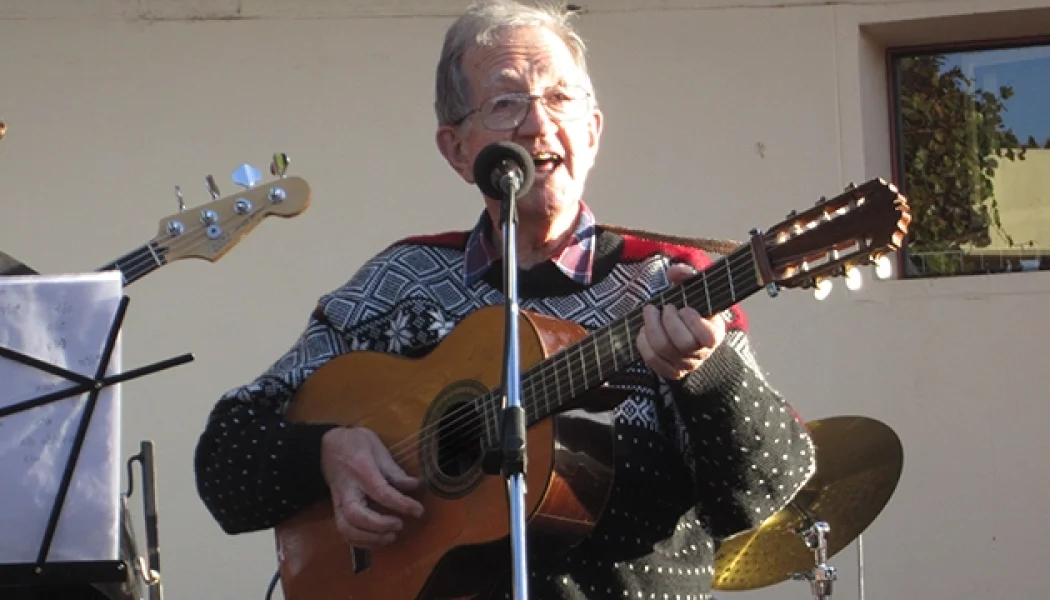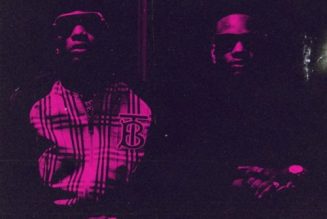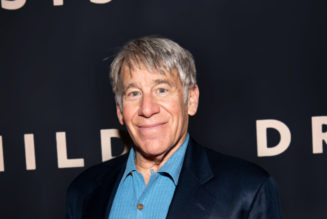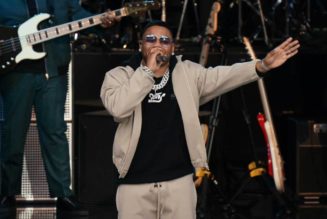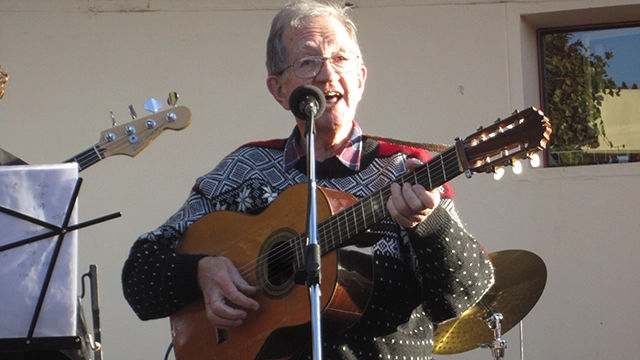
Andrew Tracey was born in Durban, South Africa on 5 May 1936 to Ursula Tracey (nee Campbell) and Hugh Travers Tracey, who was then Director, SABC Durban. When Andrew first heard African music as a young boy, he jumped up to join in with the competing teams of Zulu dancers. In the family’s garden, a 16-piece Chopi timbila xylophone orchestra from Mozambique in residence to assist with Hugh Tracey’s research gave him close-up exposure. He lived in Durban until 1947, when he moved with his mother and brother Paul to live in England at his mother’s family home and be ‘properly educated’. He excelled academically at Rose Hill boarding school in Gloucestershire and received a scholarship to complete high school at Charterhouse. He learned to play clarinet during the years at Charterhouse and performed in trios and quartets in the drawing room with his maternal grandmother, Amy Campbell, and his uncle and aunt, Ian and Peggy, on piano, cello and violin, respectively. With his gift for music, he taught himself to play the guitar and learned the songs on field recordings of Congolese guitarist Jean Bosco Mwenda his father sent to him, along with a guitar, when he was a teenager. He loved his visit with his father in South Africa while he was growing up; he knew he would return to work with him as soon as he finished his education.
After high school Andrew completed his two years of mandatory service with the British army in Kenya. Having a flair for languages, he became fluent in kiSwahili during this time. He then returned to England and enrolled at Exeter College, Oxford for a degree in Social Anthropology, German and French (1957-1959). While at Oxford Andrew served as president of the folk music society and honed his skills as a guitarist and arranger by learning folk songs from various international students and calypsos by Lord Kitchener, singing and accompanying himself at local venues during the height of the folk music revival in England. When he graduated, Andrew bought a motorbike and toured Europe before crossing from Marseilles to Mombasa and riding through central Africa and then down through Zambia to South Africa to join his father at the International Library of African Music (ILAM) in Roodepoort, near Johannesburg. Hugh Tracey had founded both ILAM and African Musical Instruments (AMI) in 1954; ILAM as a research institute and repository for his numerous field recordings and instrument collection, and AMI to produce and distribute the kalimba he invented for use in African music education in schools.
Andrew’s first assignment was to assist Hugh Tracey and with establishment of the Kwanongoma College of Music in Bulawayo, to specialize in African music instruction and teacher training in order to safeguard and promote the African music traditions of Zimbabwe. There, in 1960-61, he learned to play Shona mbira and, with his naturally inquisitive nature, also began studying the form and structure of mbira music in order to understand how it ‘works’. His father was thrilled when he returned from Bulawayo able to play mbira and sing mbira songs with the same yodelling technique of Shona master musicians absolutely true to how the songs sounded on the recordings he made in the 1950s. Andrew’s work from that time forward had an emphasis on primary research on instrument technology and the form and structure of the music created with the instruments being researched via transcriptions and learning to play and build the instruments himself. He later assisted with the design of the marimba sets developed at the Kwanongoma College of Music that went into schools throughout southern Africa to provide an easily learned instrument for African music education that is still widely used today.
In 1962, diverted from his African music research, but not the playing of African instruments, Andrew embarked on a stage career as a musician, musical arranger, and actor for the smash hit musical comedy Wait a Minim! This show, given its title by Hugh Tracey, produced by Leon Gluckman and choreographed by Kendrew Laschelles, enjoyed a seven-year run (1962-1968) that included 13 months on Broadway and another on the West End in NYC and tours throughout South Africa, USA, Britain, New Zealand and Australia. Andrew was the arranger for the musical revue featuring more than fifty instruments (many of them African) played by himself and his brother Paul. Jeremy Taylor wrote original songs, and Andrew adapted folk songs from his repertoire for this highly acclaimed satirical show that made audiences roll with laughter about the absurdities of apartheid in South Africa.
While the show was running in London, Andrew met Heather Beard, who was from Cape Town and living in London. A courtship flourished, and the two married on 22 May 1966 when the show moved to Broadway. It was in London, before the show’s legendary long run in New York City, that Andrew and Paul first heard Trinidadian steel band music and fell in love with it. Andrew got a ‘pan’ and was responsible for bringing steel band music into the show and then to South Africa when he returned to resume work with his father after Wait a Minum! closed in 1969. Andrew lived with his wife Heather and their young children, Mary Clare, Shaura and Geoffrey, at his father’s farm, Saronde, in Krugersdorp from then until he moved ILAM and AMI to Rhodes University in 1978.
From 1969-74 Andrew undertook multiple field excursions to Zimbabwe, Mozambique and Malawi, where he documented matepe/hera mbira among the Korekore, Budya, and Sena/Tonga in Zimbabwe, plus the Nyungwe and Chikunda in Mozambique, where he also studied nyanga panpipes and the timbila xylophone of the Chopi his father had researched in the 1940s. With this work, he defined the music genres in the region and documented the various mbira, xylophone and panpipe traditions mentioned above. Andrew documented the valimba xylophone and the bangwe board zither of the Sena in Mozambique and the Mang’anja in Malawi in 1970. He also researched the Ndau mbira in southeast Zimbabwe and documented its presence in Mozambique. He literally ‘followed’ the music to identify and determine the extent of music of similar structure and the geographic borders of the ‘musical family’ in each region. This work was extended to nyonganyonga mbira among the Barwe in Mozambique and Malawi, njari mbira among the Karanga, Zezuru and Korekore, and mbira dzavadzimu and the ngororombe pan pipe tradition among the Zezuru in central Zimbabwe, with Andrew always learning to play each instrument, the technical aspects of the instruments themselves and how to build them and the structure of the music created with them.
From this research Andrew published the instructional booklet “How to play mbira Dzavadzimu” (1970) and seminal articles on Shona mbira music, most notably “The Original Africa Mbira” (1972), “The Family of the Mbira” (1974) and “The System of the Mbira” (1984) plus others on the xylophone and panpipe traditions he studied. Andrew collaborated with Gei Zanzinger during this time in the making of three films of Chopi timbila orchestra performances in Mozambique (1973, 1980) plus six films on Shona mbira music in Zimbabwe (released in 1975 and distributed internationally). These films and publication of ILAM’s scholarly journal, African Music, kept the International Library of African Music in the forefront of research on African music in the 1970s, despite worldwide sanctions against South Africa, then at the height of apartheid. ‘Pulse Notation’, the transcription method Andrew devised and taught, was first presented at the Sixth Symposium on Ethnomusicology (1987) and later expanded in 1997 under the title, “Transcribing African Music in Pulse Notation”. Many students taught by Andrew and scholars worldwide benefitted from this comprehensive and detailed system for the very complicated process of putting musical sound onto the page.
Following on Hugh Tracey’s observations about the importance of music in social life, Andrew’s essay “Values in African Music” (1994), articulates how the theory and philosophy that governs the form and structure of African music also govern the values of social life found in African societies – cooperation, coordination, group participation (call and response), unique individual parts combined to create a cohesive multi-part, often interlocking whole, and repetition. All of these elements merge to make music a unifying force that is learned by the doing of it, not by talking about it or analysing it. As Andrew said of learning to transcribe he said of learning to perform and about learning to understand African music, ‘it takes a lot of listening’. The depth of Andrew’s passion to carry on his father’s legacy has created his own, based on their mutual realization of the values embedded in Africa music and the need to preserve them.
‘Andrew Tracey’s Steel Band’, the first steel band ever in South Africa, was formed in Johannesburg in 1970. Through it Andrew influenced many a young musician with his exceptional musicianship and great ability as an arranger. The band and its leader became legendary for the tremendous popularity of their shows staged for twenty-seven consecutive years at the National Arts Festival and many other venues over its thirty-seven year life from 1970 – 2007. Throughout these years Andrew was tirelessly fund-raising for ILAM, conducting African music workshops for school groups and others and teaching numerous students to play mbira and other African instruments, notably kundi harp and amadinda xylophone from Uganda, the nyanga pan pipe dance and timbila xylophones from Mozambique as well as steel drums (pan), in Johannesburg and then in Grahamstown at Rhodes University, when he moved ILAM there in 1978 to give it an institutional home.
While Director of ILAM and editor of ILAM’s journal (1977-2005), Andrew’s 25 year sponsorship of annual Ethnomusicology Symposia (1980-2005) brought together scholars and performers from throughout sub-Saharan Africa and abroad in various locations in ways only Andrew, with his inclusive relationships with African musicians and researchers, could accomplish. The Symposium Papers published by ILAM continue to provide a rich resource for scholars of African music. Andrew was granted an honorary PhD by the University of KwaZulu-Natal and a promotion to Associate Professor by Rhodes University in recognition of his enormous contribution to scholarship, teaching and preservation of African Music. Andrew’s gentle effervescence and untiring work to promote understanding and respect for African music and musicians captivated everyone from school children to corporate executives, to his students and colleagues. The many diverse audiences who enjoyed performances of Andrew Tracey’s Steel Band, his band members and participants in his African music workshops and/or ILAM tours over the years need to be added to this list.
In the years since his retirement in 2005, Andrew remained active as a performer regularly singing and playing his pan or guitar and telling Shona folktales at ILAM Outreach Concerts where he charmed audiences with his buoyant performance style. In addition, he published two articles from his Ndau and Hera mbira research in African Music, highly appreciated by mbira scholars. Further, Andrew provided his large collection of transcriptions of mbira music for online access in aid of the work of the “Sympathetic Resonances” project (sympathetic-resonances.org) to promote retention of mbira traditions. Never idle, he also wrote many arrangements for music performances and concerts at the Anglican Cathedral, where he led the Cathedral marimba band and sang in the Cathedral choir.
Andrew passed away on 12 January 2024 at St George’s Hospital in Port Elizabeth/Gqeberha due to complications after colon surgery. Preceded in death by his daughter, Shaura (1969-1977), he is survived by his wife Heather, daughter Mary Clare, son Geoffrey, brother Paul and grandchildren Tamara, Bethany, and Ash. A last message of Andrew to his son Geoffrey, as he demonstrated in his life work, was a plea for support for researchers of the indigenous music of Africa and the musicians who perform it.
Compiled by Diane Thram, Professor Emerita, Rhodes University; authorised by the Tracey family
